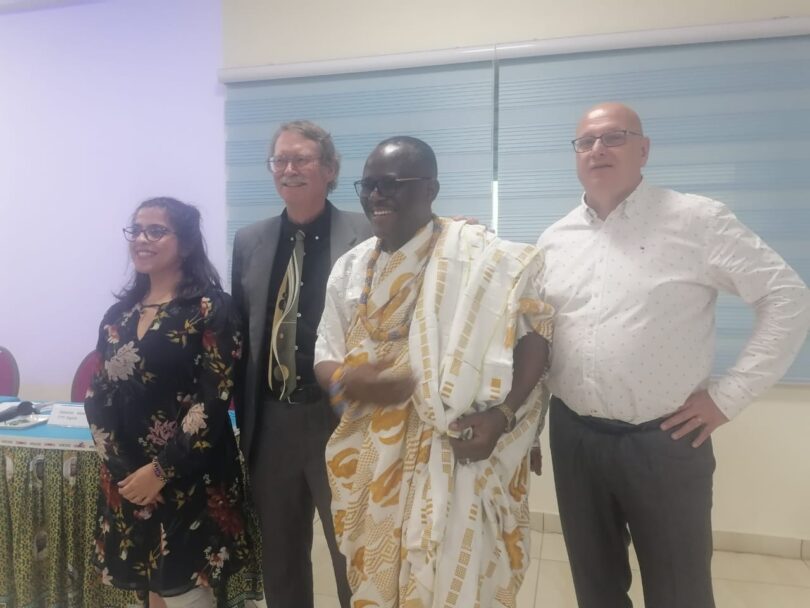Report By: Ishmael Barfi
According to the Deputy General Secretary of the General Agricultural Workers Union (GAWU) of TUC GHANA, Mr. Andrews Addoquaye Tagoe over 72% of Child Labour in Africa is found in agriculture-related operations.
To him, conscious efforts from stakeholders are crucial in addressing numerous challenges in the combat against child labour in the agriculture sector across the African continent.
Speaking further, he indicated that the latest International Labour Organisation (ILO) and UNICEF reports suggest that about 160 million children globally are in child labour.
Mr. Andrews Tagoe made this disclosure in an interview during a two-day Global Capacity-Building training for Trade Unions, Civil Society Coalition in SDGs, the Media (SOMOPAC), the National Union of Food, and Non-Governmental Organizations in the fight against Child Labour in other pathfinders West African countries such as Nigeria, Cote D’Ivoire, Cameroon.
The Global Capacity building held on 29th May 2024 in Accra was organized by Global March Against Child Labour (Global March) in partnership with the Trade Union, Civil Society Coalition in SDGs, Media (SOMOPAC), National Union of Food, and Child Labour NGOs from other countries and to share their experiences on how to use integrated approaches towards child labor free zones and to announce to the world that, Africa is of age and capable in solving their child labor problems.
The Global March Against Child Labour (Global March) is a worldwide network of trade unions, teachers’ associations, and civil society organizations that work together towards the shared development goals of eliminating and preventing all forms of child labour, slavery, and trafficking and ensuring access by all children to free meaningful and good quality public education.
Global March mobilizes and supports its constituents to contribute to local, national, regional, and global efforts support a range of international instruments relating to the protection and promotion of children’s rights, and engage with the United Nations, international, inter-governmental agencies, and civil societies.
The Deputy General Secretary of the General Agricultural Workers Union (GAWU) of TUC GHANA, Mr. Andrews Addoquaye Tagoe pointed out that statistics on child labor alone in Africa are more than in the rest of the world combined.
When it comes to child labor, Mr. Tagoe was of the view that it does not take an individual or organization or one Ministry or one Department to address it because it is a collective responsibility.
“Some people are service providers to children so they provide services for children. Some people are strengtheners of corporations and local unions so, they do that. Some people are Chiefs and they help in that. Some people are teachers and they help with that. So, all of us, governments, civil society, and community-based organizations have a role to play. When these roles are integrated, we give it the name “Child Labour Free Zone”, he reiterated.
Elaborating on the Child Labour Free Zones, he indicated that, is a community development module that is focused on ensuring that, all children who go to school are out of child labour and become future adults with decent work.
He further disclosed that people with the problem are difficult to locate because, they are in remote areas but advised that, those working to address child labour must begin to develop strategies that would take them to communities across the lake and hard-to-reach areas.
Therefore, it emphasized that resources are needed to transport those working to address child labor to where the people are citing “Crossing the Volta Lake, we need boats and machines to be able to cross and after we have crossed, we need support to put the system into place. We need systems to promote Child-Labour-free Zones. And that is what we have experimented with in Ghana and the government has adopted it. ILO has adopted it as one of the best practices so, a journey of 1000 miles begins with a step”.
He stressed that, when it comes to child labour issues, Legal and Research have indicated that 1 out of every 5 children in Africa is an activity that can be classified as child labour.
Touching on cultural practices in Ghana Mr. Andrews Addoquaye Tagoe hinted that child labor has been seen as the norm, hence people’s opinion that cultural practices accept child labour has enabled people to have an opinion that culture accepts child labour but was quick to add that, child labour is not part of cultural practices and needs to be discouraged.
Adding that, culture should not be used as an excuse to get children out of school saying “I don’t know any part of the World that does not believe in education and that, because of their culture, its children should not go to school”.
Affirming that anywhere a child is doing activities and is denying the child his education, then the child is at risk. “It is denying the child of his physical development. The child is being exposed to moral activities like commercial sexual exploitation”.
Mr. Tagoe used the occasion to introduce Mr, Freeman, An Assemblyman who was rescued from child labour activities. He was among the panelists who shared their experiences and how he is effecting a community-based approach to transform and educate parents in communities where child labor is ongoing.
Source: www.thenewindependentonline.com









